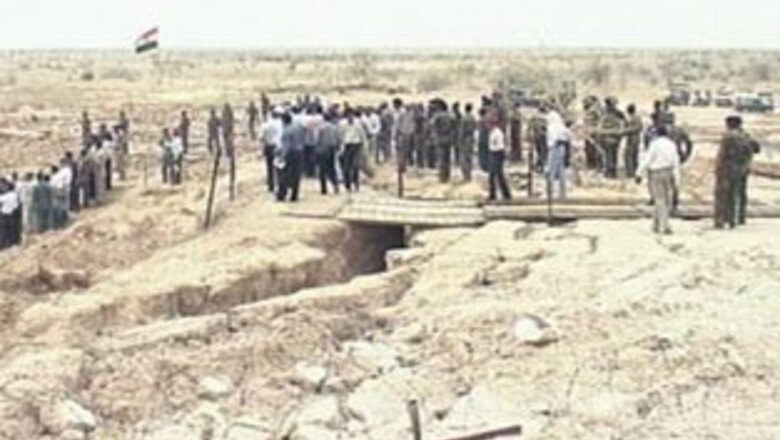
views
Islamabad: Pakistan on Thursday described the latest dossier provided by India on the Mumbai attacks as a "rehash of information" contained in previous documents, indicating that it is inadequate for taking action against Lashkar-e-Toiba (LeT) founder Hafiz Mohammad Saeed.
"The last dossier from India was a rehash of information received in previous dossiers," Foreign Office Spokesman Abdul Basit told a weekly news briefing.
Basit was responding to a question about India linking the resumption of peace talks to Pakistan taking action against the perpetrators of the Mumbai attacks, including Saeed. New Delhi has accused Saeed of playing a key role in planning and facilitating the attacks.
The spokesman did not say how Pakistan intended to deal with Saeed, for whom Interpol recently issued a Red Corner Notice.
The trial of suspects arrested by Pakistani authorities in connection with the Mumbai attacks is proceeding and Islamabad is "serious about bringing the perpetrators to book," Basit said.
At the same time, he said, Pakistan "still believes that the composite dialogue is the only way forward." He also made it clear that if the stalled dialogue were to be resumed, "it would not be a favour to Pakistan because talks and exchange of views is the only way" to improve ties between the two sides.
"Whether we like it or not, we have to come to the negotiating table. And our view is the sooner the better," Basit said.
In response to another question, he said Pakistan was awaiting India's formal response to its invitation for Foreign Secretary Nirupama Rao to come to Islamabad for talks with her Pakistani counterpart Salman Bashir.
"We do not yet have a date or venue for a meeting between the Foreign Secretaries," he said.
Basit also said there was no proposal for the Prime Ministers of the two countries to meet on the sidelines of the Commonwealth Summit in Trinidad in November.
India put on hold the composite dialogue process in the wake of the Mumbai attacks, which were blamed on the Pakistan-based Lashker-e-Taiba (LeT). A Pakistani anti-terrorism court is currently trying seven suspects arrested by authorities in connection with the assault.
Among them are LeT operations commander Zakiur Rehman Lakhvi and communications expert Zarar Shah.
Basit also said that Pakistan was "disturbed" by reports that India could be preparing for additional nuclear tests and hoped a unilateral moratorium on testing would remain in place in the region.
"We are disturbed by media reports that India might be considering to conduct additional (nuclear) tests," Basit said at the same weekly news briefing.
Basit was responding to a question on concerns expressed by Indian Army chief General Deepak Kapoor about a reported increase in Pakistan's nuclear arsenal.
Pakistan does not "discuss the contours of our deterrence in public" but is committed to maintaining a "credible deterrence at the minimum levels," he said.
Pakistan is also opposed to any arms race in South Asia, he added.
"We have proposed a regional restraint regime, including a regional nuclear test ban treaty. The proposal is still on the table. We hope a unilateral moratorium on testing in the region will continue to be observed," Basit said.
Leading Indian defence scientist K Santhanam's recent remarks that the test of a thermonuclear bomb in 1998 was not as successful as was claimed triggered speculation that New Delhi could be preparing for further tests to validate the design of its nuclear weapons.
Prime Minister Manmohan Singh has refuted Santhanam's claims.
In response to another question, Basit said Pakistan was not "blocking" nuclear disarmament talks at the UN-sponsored Conference on Disarmament.
"Pakistan has shown flexibility and did not block the talks. We would not like our genuine security interests to be compromised in any manner," he said.
Earlier this week, arms negotiators failed to clear the way for the start of talks in Geneva on nuclear disarmament as Pakistan said its security interests had not been respected.
The Conference on Disarmament broke a 12-year stalemate in May when it agreed on a "work programme" to begin negotiations on banning the production of fissile material for nuclear bombs.
Basit said Pakistan went along with the work programme in May with the hope that it would lead to a balanced outcome.
This included progress on nuclear disarmament, banning production of fissile material, preventing an arms race in outer space and "negative security assurances," whereby countries vow not to use atomic weapons on non-nuclear weapon states.
"We have legitimate concerns...the other countries did not show flexibility and so the Conference on Disarmament could not implement the work programme," he said.




















Comments
0 comment